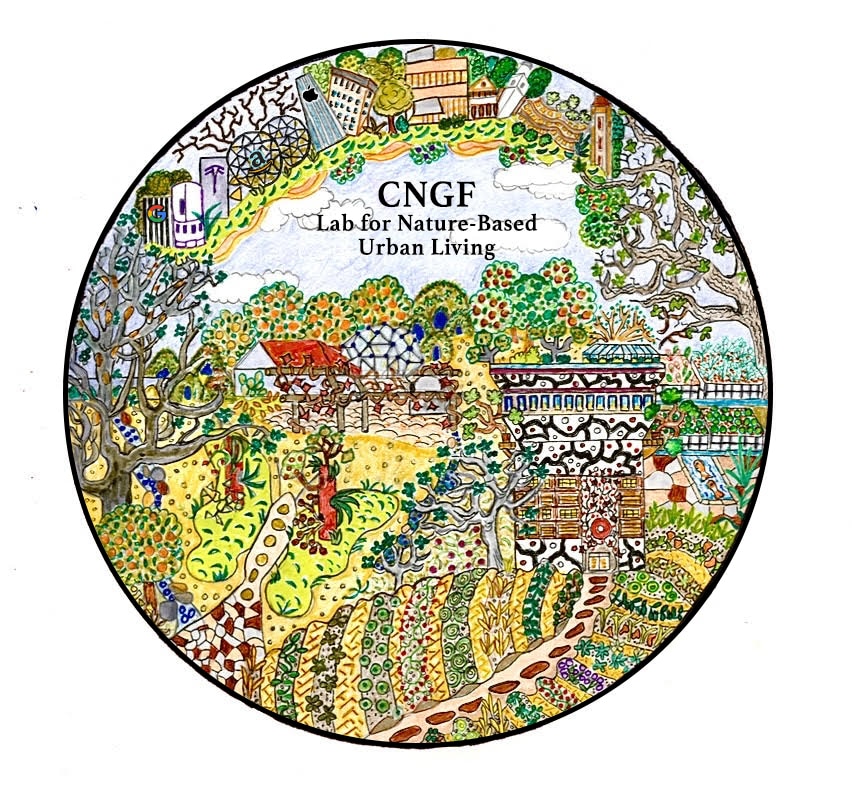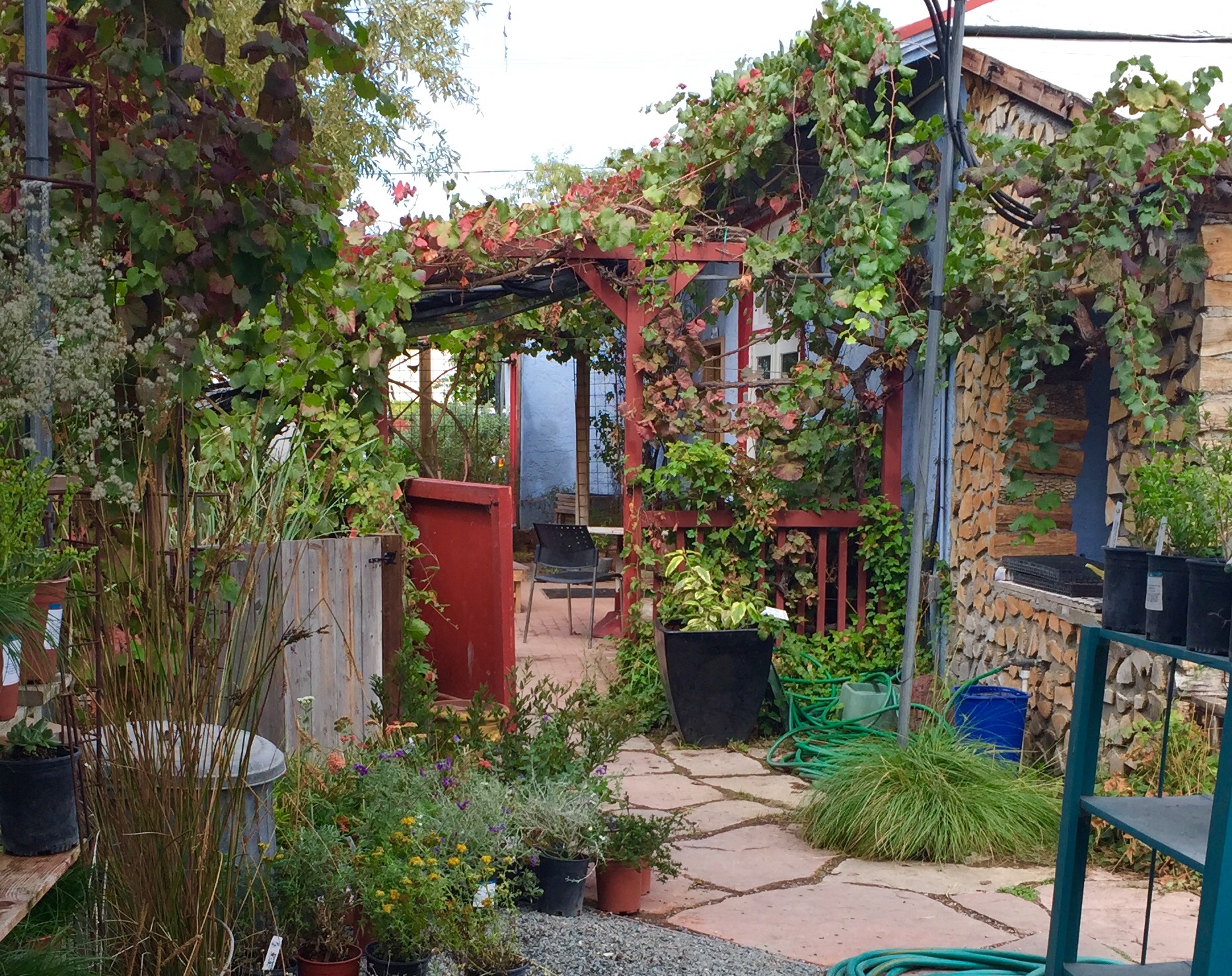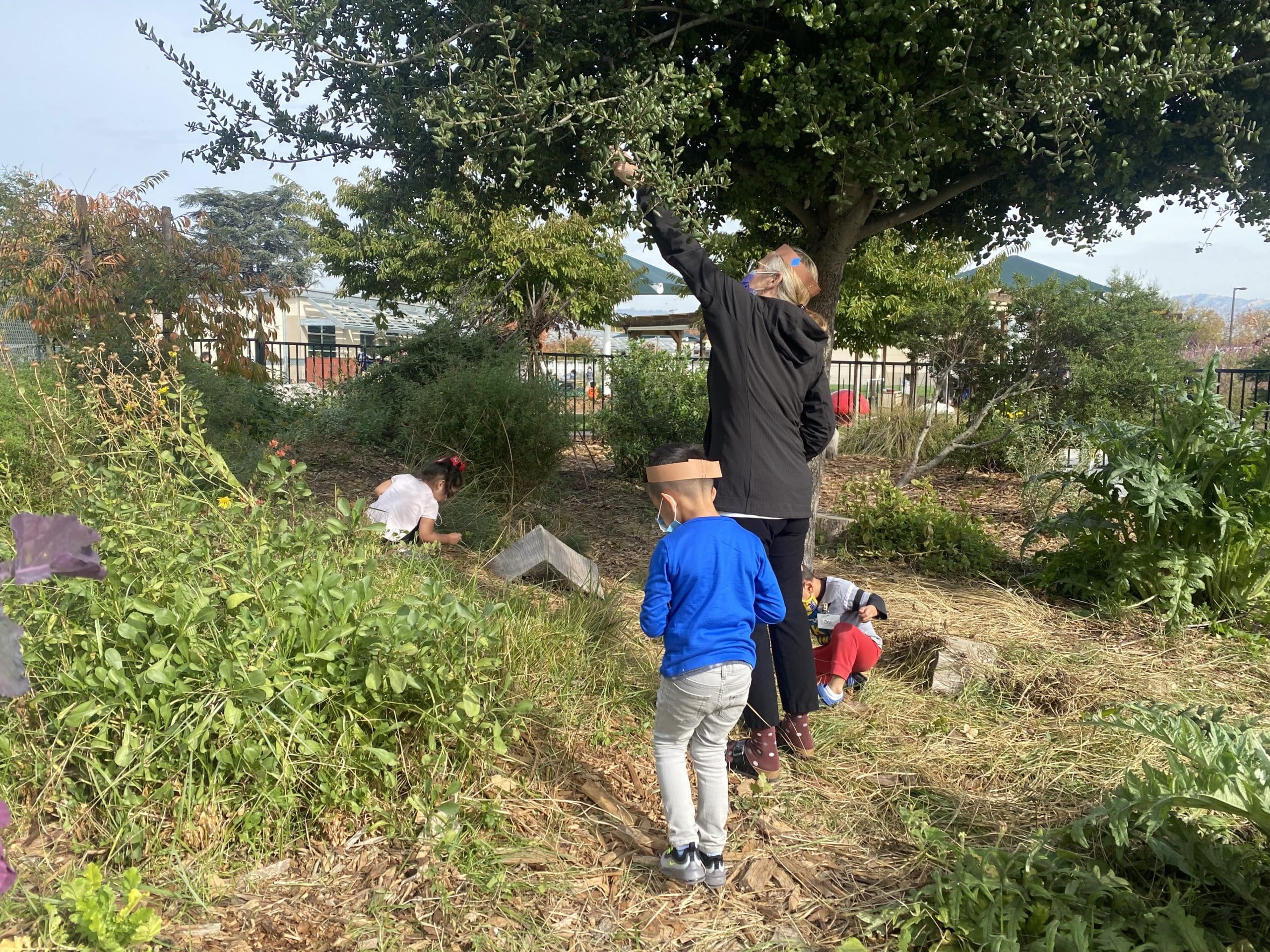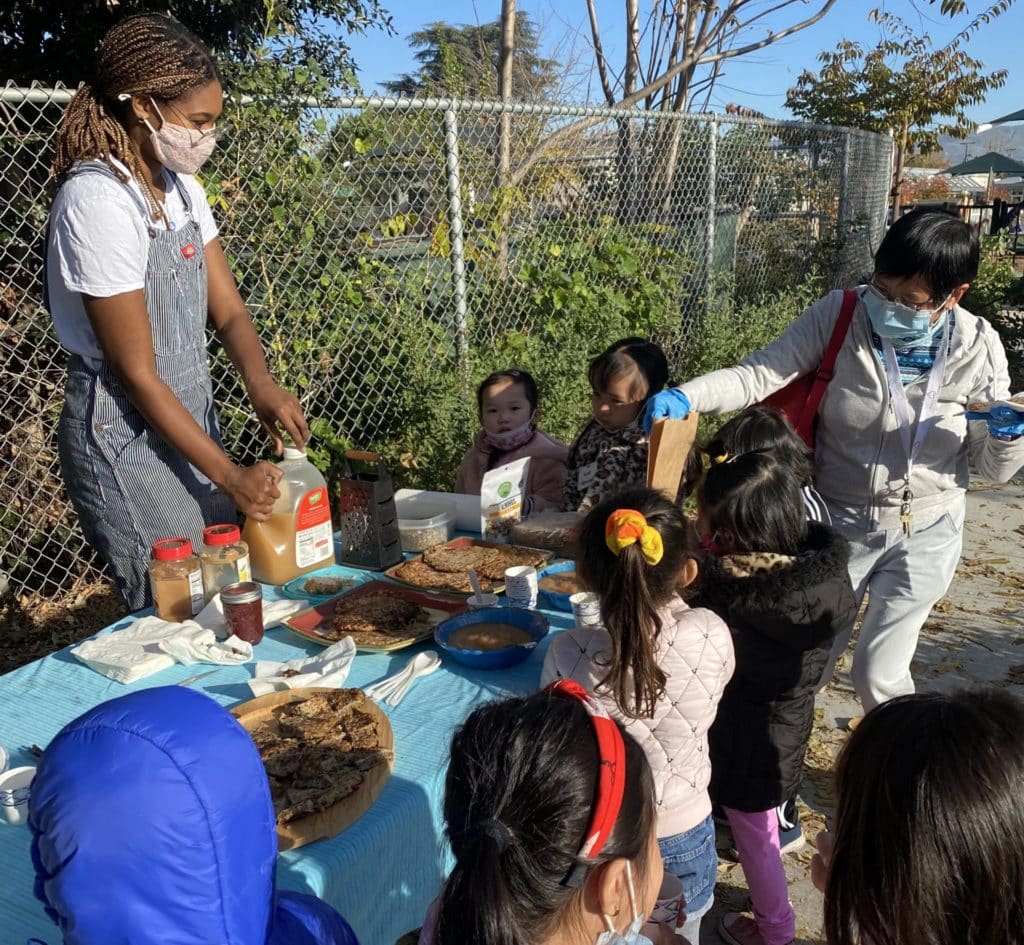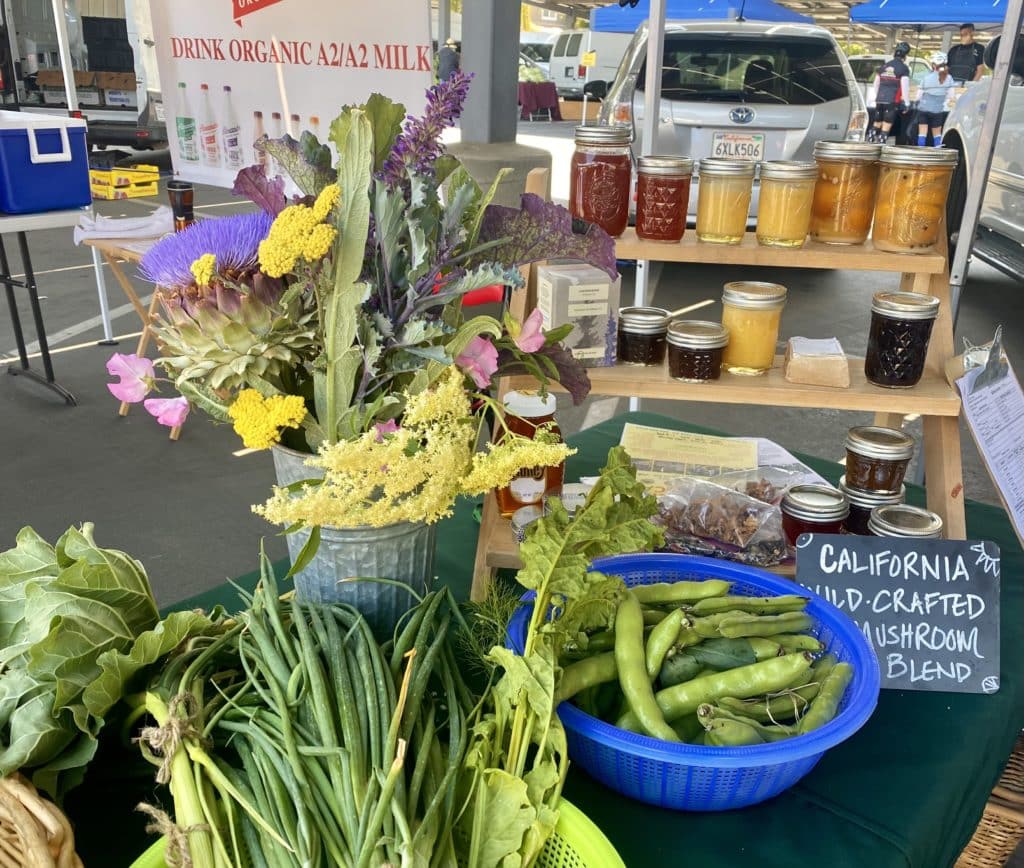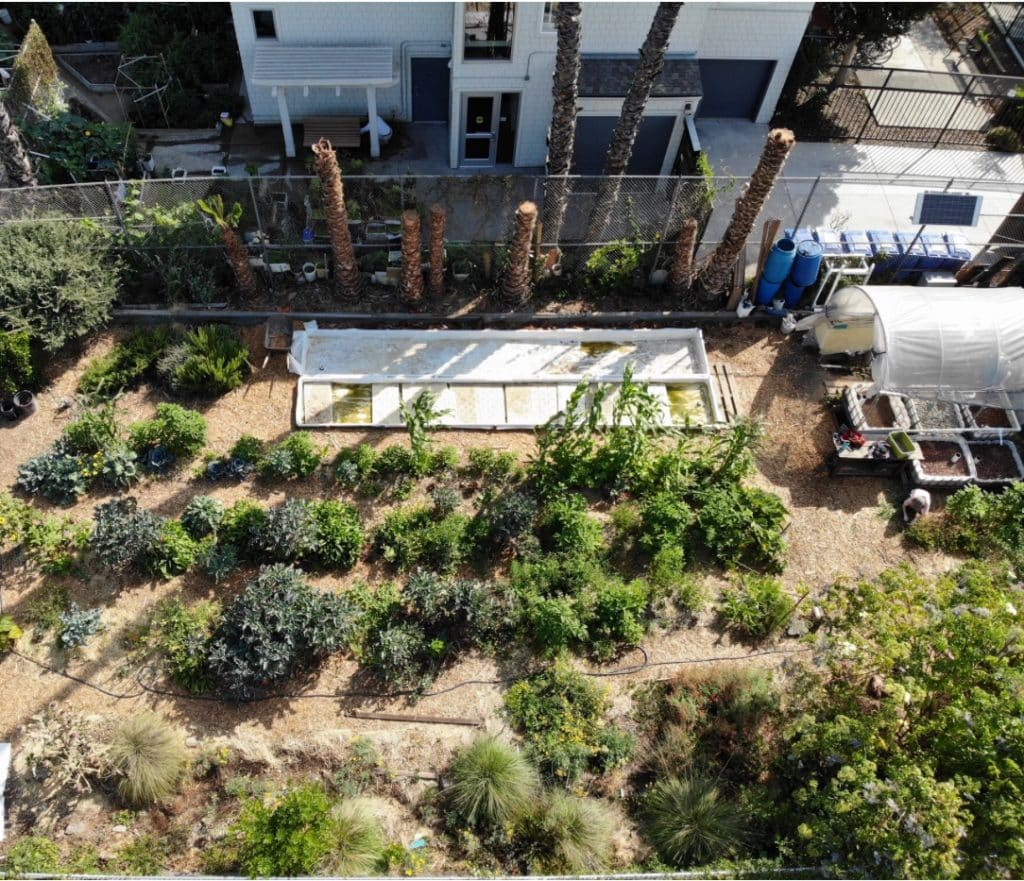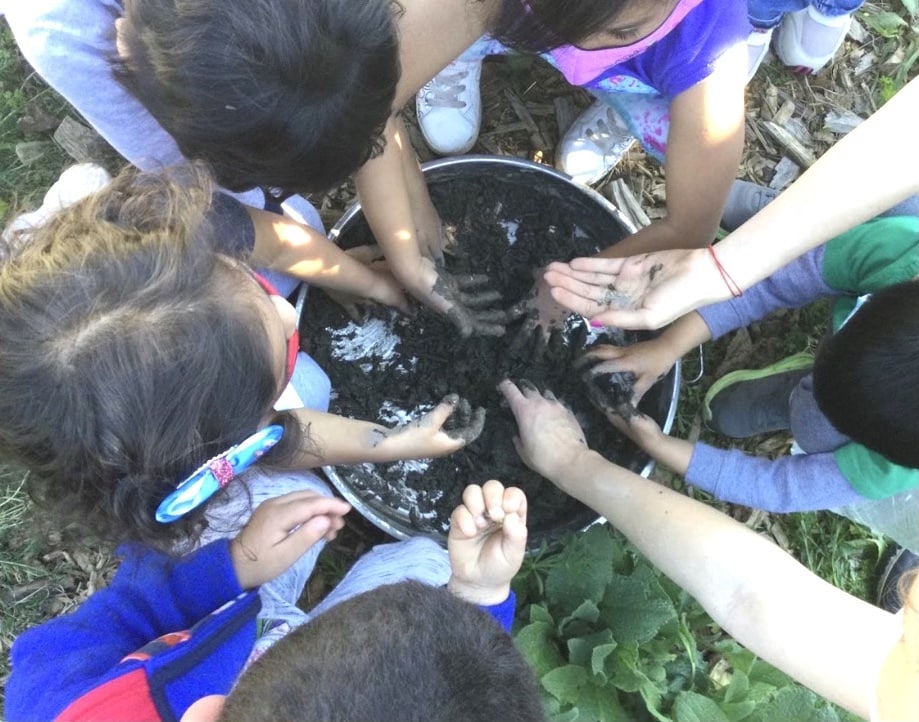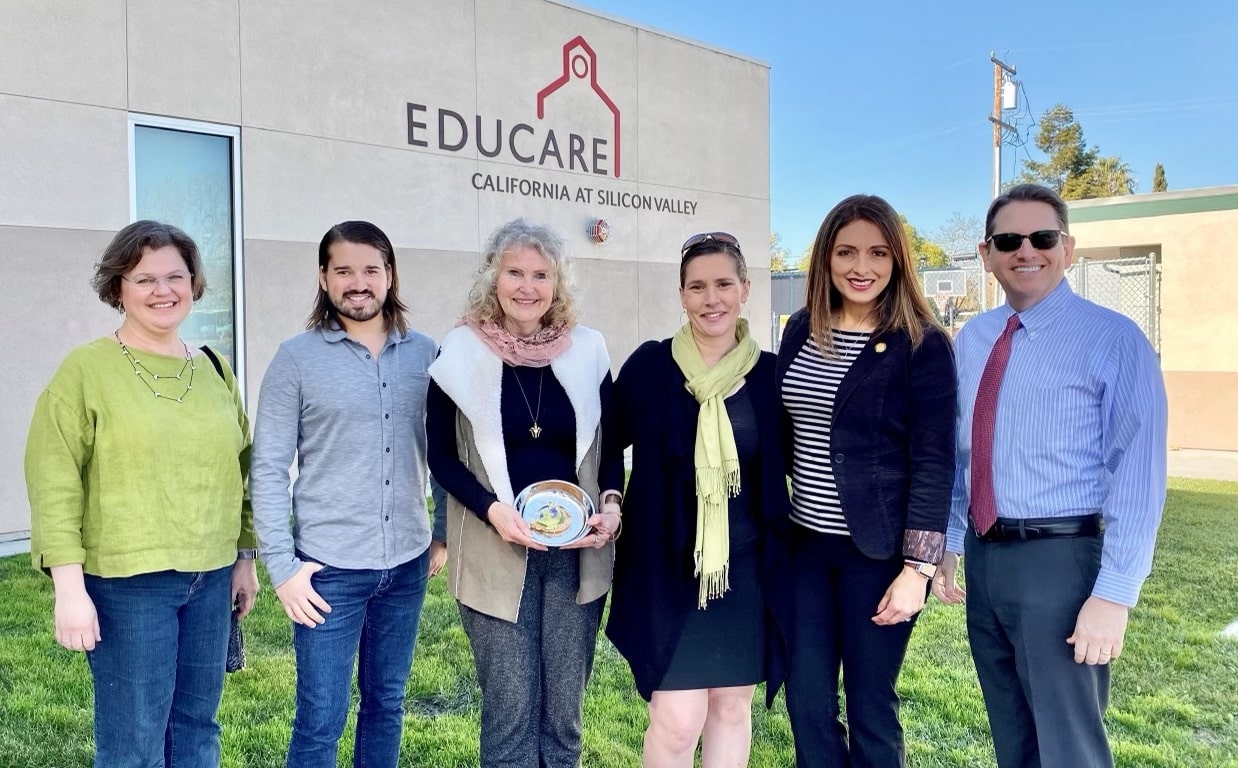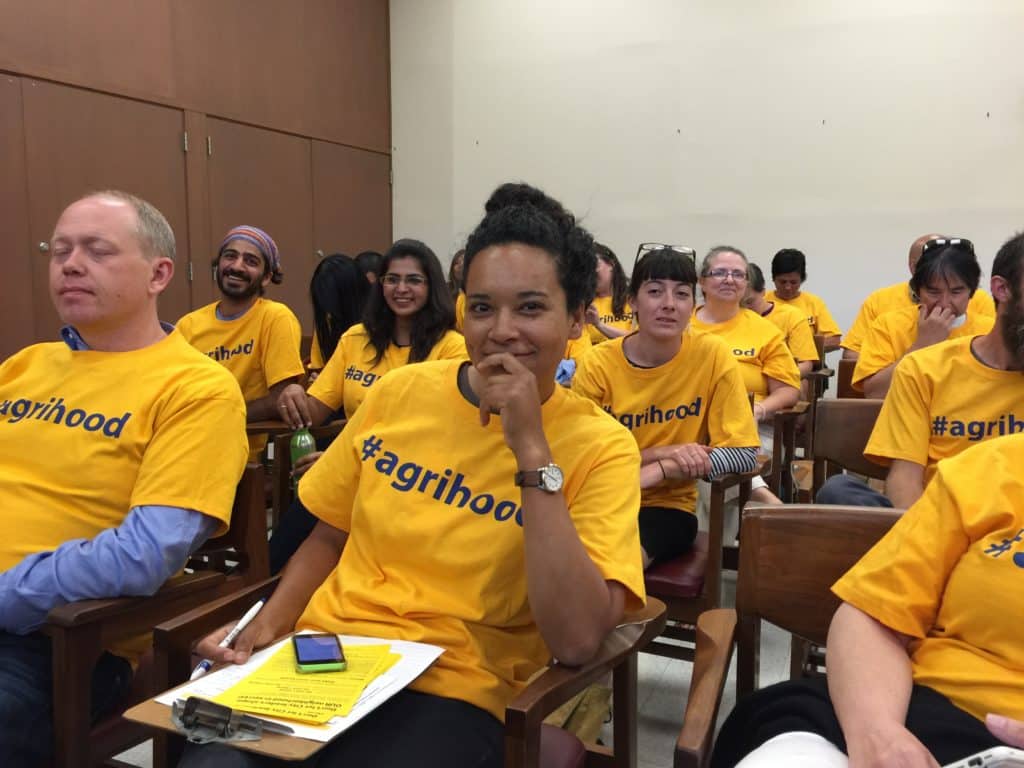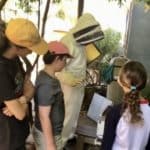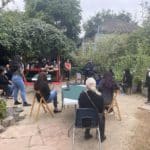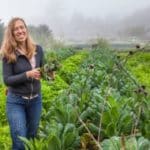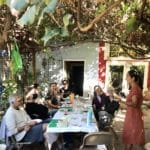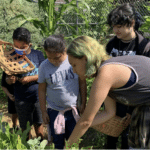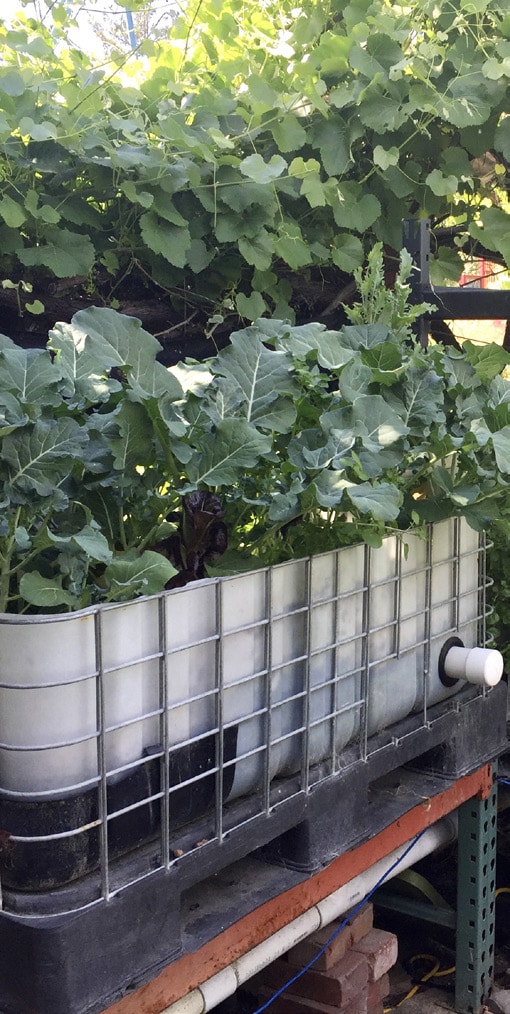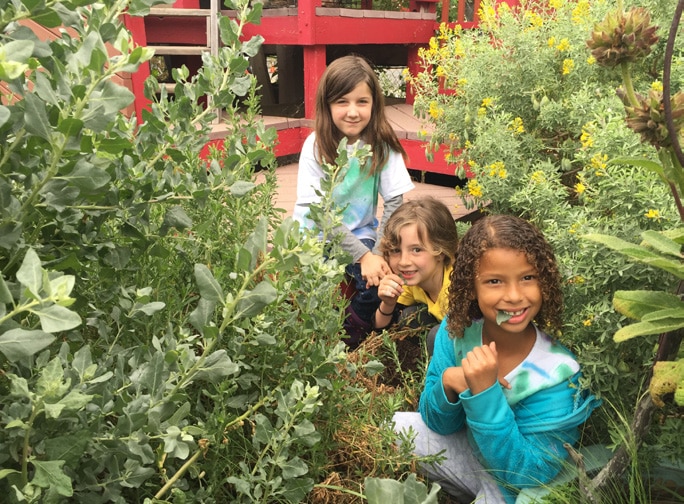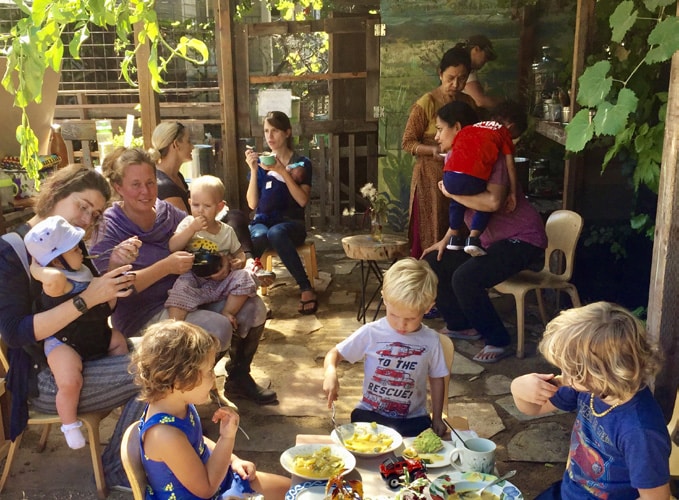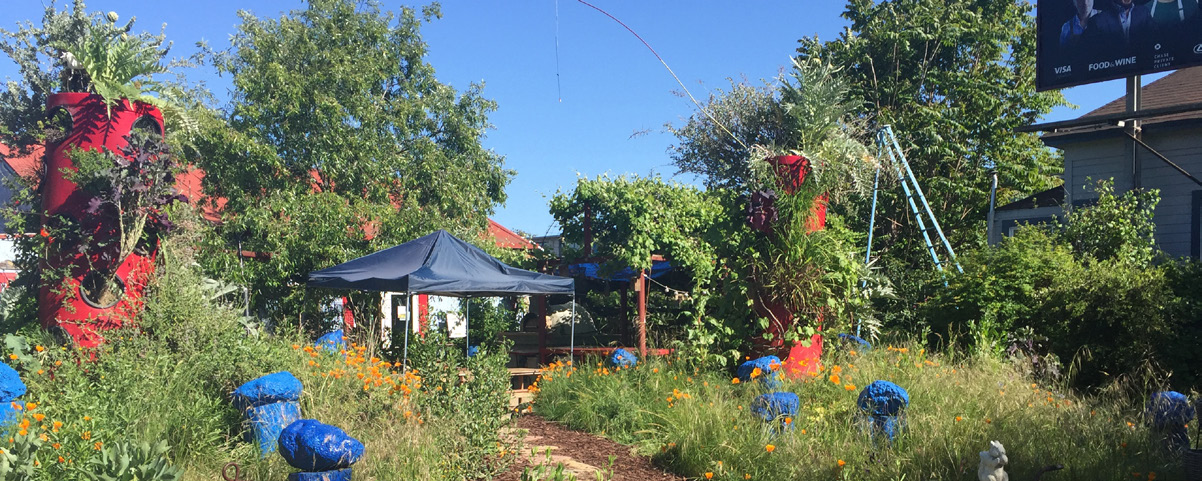We are no longer a rural species: over half the world’s people live in urban areas, and many have forgotten how to grow their own food. We believe this knowledge is a human birthright, and we must restore it where more people actually live.
A Framework for Sustainable Cities
A model for future land use, the Lab for Nature-Based Urban Living embodies a vision for the current gardens at 76 Race Street in midtown San Jose to become the nexus for the Build 25 network of Eat•Grow•Learn Centers in Santa Clara County. In partnership with local institutions, the site is currently being used to host:
- Affordable housing for youth leaders and managers;
- California native plant-based Culinary Arts Institute;
- Outdoor education center;
- SITES-certified native, regenerative landscape;
- Regenerative Organic Agriculture (ROA) and aquaponics;
- Sustainable job training and certifications; and
- Community events and programs.
The Lab for Nature-Based Urban Living encompasses two sites, our ELSEE gardens at 76 Race St and Hester Farm at 1440 The Alameda in San Jose. The Lab will act as the hub and incubator for a network of small business models developed through sharing knowledge and resources between students, scientists, landowners, educators, and other volunteer community members.
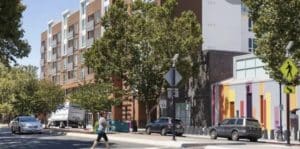
The site will utilize renewable energy, onsite stormwater management, rainwater collection, greywater reuse, aquaponics, repurposed materials, and conversion of solid fish waste to biogas for cooking and organic fertilizer production. Our hub maximizes both indoor and outdoor uses and can be easily integrated into the Alameda Urban Village, a key part of San Jose’s 2040 general plan.
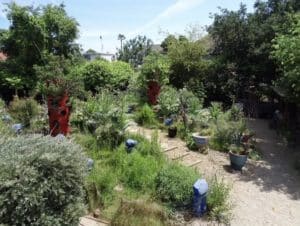
CNGF is collaborating with our science advisory consortium, comprised of scientists who are researching urban agriculture technology, including methods to increase carbon sequestration, and other scientists whose research focuses on soil microbial networks in relationship to human immune system function. Our goal with our science advisory consortium is to integrate ongoing hypotheses and peer reviewed published research so that we will continuously supplement and inform our network of Build 25 partners. The Lab for Nature-Based Urban Living will be the first ecology and food sovereignty based development of CNGF’s Build 25 Initiative, a network of 25 urban agricultural community centers that utilize regenerative urban land use practices to be built by 2025. The Center will be an example for other communities, landowners, and developers to follow.
The framework driving the vision has a simple goal: to meet all human life-cycle needs locally, while minimizing use of fossil fuels. Our human life-cycle needs are: clean water, clean air, healthy soils, healthy local food, waste management to produce energy for food and heating on site, healthy ecosystems including restored native plant communities, renewable energy, non-fossil fuel transportation, ecological education, and land stewardship.
Our guiding principles are to:
1. Teach all children nature immersion outdoors
2. Provide meaningful and resilient jobs
3. Integrate regenerative agriculture food production and native habitat with urban land use
4. Transform urban land use quickly, allowing nature to do the heavy lifting
5. Collaborate with scientists to research impacts of nature immersion and habitat restoration
6. Share best practices across regions and ecosystems
7. Partner with local landowners, including corporations
By creating these models quickly and generating data that supports CNGF’s purpose, our region can serve as a model to other communities.
Teach Nature to All Children
Baba Dioum, Senegalese ecologist, said, “In the end, we will conserve only what we love, we will love only what we understand, and we will understand only what we are taught.”
Worldwide, more than half the world’s population live in cities built of concrete and asphalt. Children today are disconnected from nature; they may believe they live on a virtual planet, not a finite one.
Provide Meaningful and Resilient Jobs
Addressing climate change in a reasonable way means we need to value the work and make meaningful, low-carbon jobs available for young people with a wide range of skills. By focusing on education and training youth, we prepare them to learn new jobs outside of the petroleum economy that will provide for human health and well-being, a flourishing local biodiversity, local food security and sovereignty, and a healthy planet.
Integrate Food Production and Native Habitat with Urban Land Use
The native people of California ate a variety of plant foods – hundreds of them – yet modern residents limit their diets on average, to only 12. In Silicon Valley, young people are cut off from nature. Many suffer food insecurity while institutional landowners plant ornamental plants on acres of underutilized land that once produced food, a highly inefficient and unsustainable use of land.
Transform Urban Land Use Quickly
Central to the CNGF vision is the Build 25 initiative. The ideal site includes a place where people gather, such as an affordable housing village, job center, school, or existing neighborhood. Each site centers around a regenerative farm with native ecological gardens. These serve as education, training and research sites so youth can learn how to design, build and mange them. Each resident can reduce their carbon footprint to zero.
Research impacts of nature immersion and habitat restoration
Recent scientific research has shown that diet and exposure to natural environments, including soil microbial biodiversity, play a crucial role in the ability of young people to focus and succeed academically. Time spent outdoors has a direct, positive correlation with a child’s ability to focus in school. CNGF encourages research into the impact of plant-based nutrition and nature immersion outdoor education on academic performance, as well as physical and emotional health.
Share best practices across regions and ecosystems
CNGF develops and licenses ELSEE curriculum, based on teaching gardens with ecological immersion. As the home of CNGF and the Lab for Nature-Based Urban Living, the original ELSEE garden serves as both a community teaching garden and as the flagship model for our teaching and training programs, designed for ages 0 to 99 years. Besides our Lab for Nature-Based Urban Living, we are continuing to develop ELSEE gardens at Educare Silicon Valley, Cureton School, FIRST5 Family Resource Centers, and other underserved school districts of our region.
Partner with local landholders, including corporations
CNGF seeks corporate partners of all kinds — governments, religious organizations, publicly traded companies — to show leadership by allocating land for community use. We have had some interest from well-known corporations and are seeking to build our capacity to pursue these opportunities as Google, LinkedIn and others are expanding holdings in Silicon Valley. Board president, Nancy Smith, is seeking to build support through her book with the working title Virtuous Corporation: Thriving in the Corporate Age, targeted for publication in 2022.
Redefining Careers and Education
CNGF is developing seven sustainable job tracks with the Workforce Institute of San Jose Evergreen Community College District. Classes for these new tracks – which include early childhood and outdoor STEAM education, ecological land management, plant-based culinary arts, and ecological engineering – will all be held at the Lab for Nature-Based Urban Living. Aligning with CNGF’s mission, these tracks will provide affordable, accessible training for college students to acquire skills that will allow their generation to solve the most critical and urgent issues of our time.
Continuing a Legacy of Community

The CNGF garden has been a key part of the surrounding community for 21 years, teaching students of all ages and backgrounds about regenerative land use practices, food access, and native ecology. Over the years, the local California native plants in the garden have grown into key habitat for many types of wildlife, including birds, pollinators, and insects.
The garden is the first model of an Environmental Laboratory for Sustainability and Ecological Education (ELSEE), an outdoor teaching garden and model for 10,000 California public schools. ELSEE was designed, built and managed to gain SITES Certification as part of the Sustainable SITES pilot project, and meets 200 benchmarks for the protection of ecosystem services. These programs were matched with lesson plans and curriculum traditionally taught indoors. Our lessons and project-based learning activities fulfilled CREEC (California Regional Environmental Education Community), as well as the Core Curriculum and Science standards for grades pre-K through 8.
For the past 18 years, our ELSEE teaching gardens have provided daily opportunities to expand our community and build a network of regenerative land use models throughout Santa Clara County.
Land Justice as Social Justice
If we are to change the current trajectory of climate change and invest in solutions that create a positive future for all people, we must change the way we use land in urban spaces.
The Lab for Nature-Based Urban Living functions like a plant – most of the resources it needs to complete its lifecycle can be found on site. Fruits and vegetables grown around the site will feed those living in the affordable student housing and provide produce for the Culinary Arts Institute. Permeable hardscapes will recharge water aquifers, water will be reused in the landscape, and native landscapes will take precedence over agriculture, employing aquaponics and polyculture grow beds to grow non-native food plants intensively.
By reconnecting with ecological processes, reintroducing multi-functional landscapes into the urban area, and providing accessible higher education in sustainable fields of work, we will begin to repair the damage done by the current methods of development and heal our communities.


